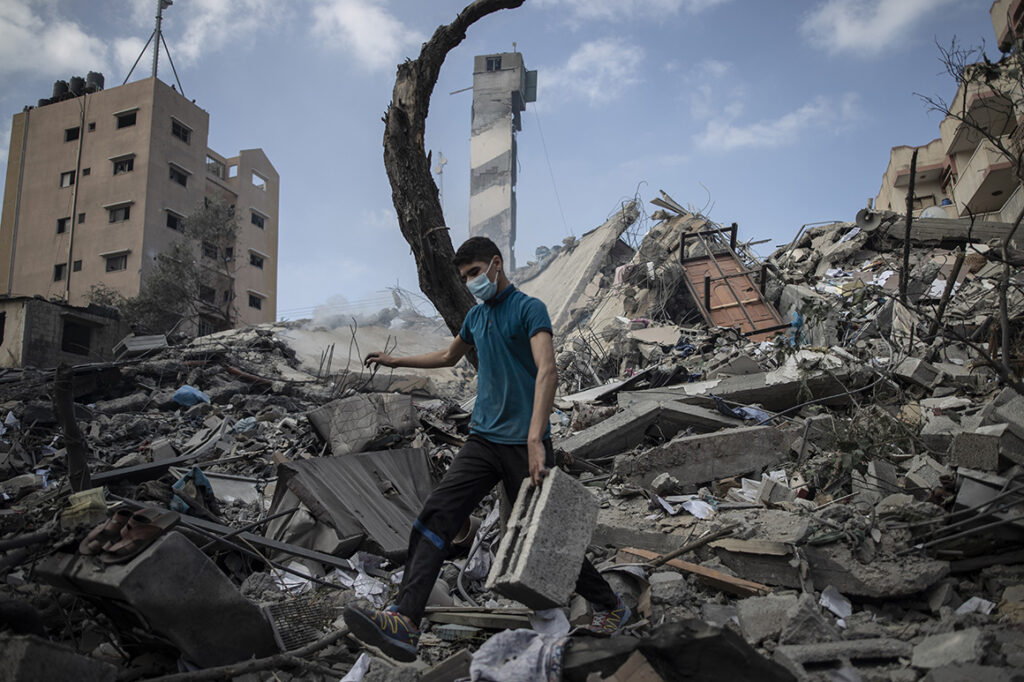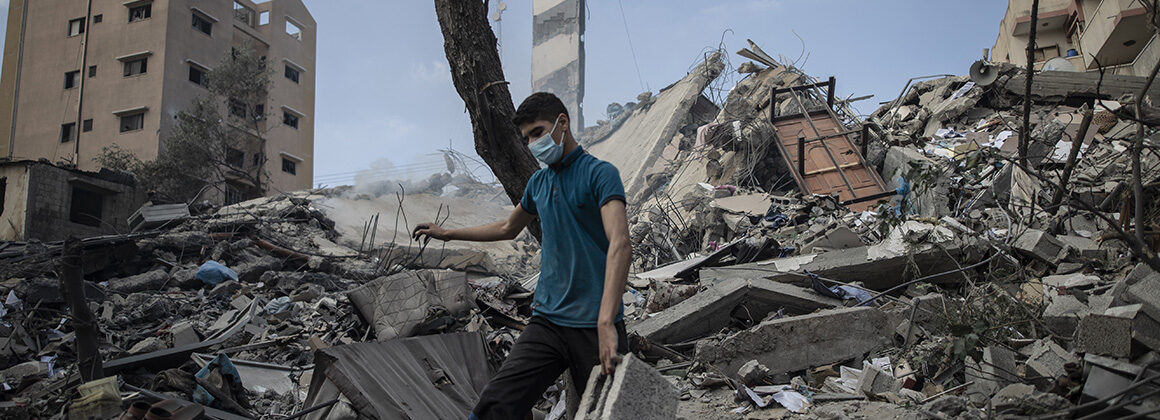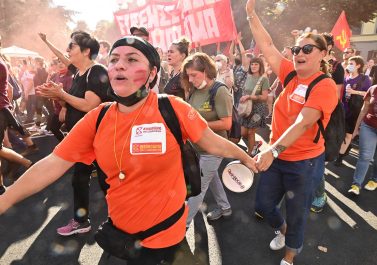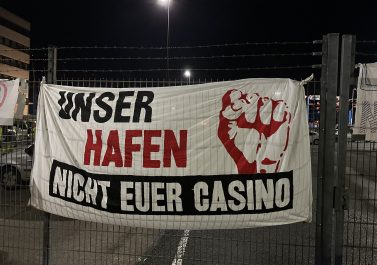
Over the last two weeks, the Israeli state has launched devastating aerial attacks on Gaza, and Hamas have fired over 3,000 rockets towards Israel. The dead now number 13 from Israel (including 1 child and two migrant workers from Thailand) and 248 in the Palestinian territory (including 66 children) with a further 1,900 wounded. Everywhere, the bourgeoisie and middle classes, along with their representatives in the press and state, have wept over the mounting corpses in the hopes that their crocodile tears will wash away the evidence of their complicity in this barbarism. It is crucial that the working class, both in the Middle East and the world over, sees through this pantomime.
This latest convulsion was a response to the intensification of Israeli encroachment on the middle class East Jerusalem neighbourhood of Sheikh Jarrah, majority Arab. The Israeli petit-bourgeois has long since understood how to exploit their country’s property laws in their own favour, to oust the Palestinian petit-bourgeois from their homes, relieving them of whatever property they have, and sending them to join the ranks of the already bloated Palestinian working class. This has been common practice in the region since the Six Day War of 1967 earned Israel the West Bank and Gaza, but it has recently increased. The petit bourgeoisie or middle classes, composed of the professionals and bureaucrats and small business owners who dream of ascending to the status of capitalist proper, is always doomed to be crushed by the crises of capital. This gives them a desire to clasp onto what little property they have, defending it to the death, and jettisoning the sections of its class it can easily identify and throw to the wolves. The ruin of the middle class suffered in the pandemic has not only forced the Israelis to increase their expropriation of the Palestinian middle class, it has also prompted street violence in Jerusalem between Arabs and Jews, a previously rare occurrence.
The leftist whinging about the particular evils of the ‘Zionist’ state is a smokescreen that covers up its real character as a perfectly normal state completing its objective tasks. As a tool in the hands of the Israeli bourgeoisie, the state has used the discontent of the Israeli middle class to pursue its goals. The occupation allows Israeli corporations to hold the Palestinian market captive, selling at incredibly high prices while forcing Palestine to export at low prices to Israel alone. Industrial and agricultural production benefits from lower taxes and rent, and the lax application of labour laws. The swelling Palestinian proletariat is forced to seek work in Israel, but has no security due to the arbitrary machinations of the Civil Administration and Shin Bet security service. Its labour is sold cheap as it has nowhere else to go, and it often faces brutal conditions and abuse. These low wages are then used as a pretext to lower the wages of the also impoverished Israeli working class as well, two million of whom are in poverty and rely on charity just to eat twice a day. Therefore, while it is sold to them as the only way to ensure their relative security, the Israeli expansion policy is actually the mechanism for their intense exploitation. The policy has two functions then: the securing of a surplus population to lower wages and maintain profitability, and the division of the working class into two hostile camps, each weakened and vulnerable. Each section is then fed its own nationalist myth: the lie that its own bourgeois state will look out for it and build the harmonious community that will allow it to prosper. The added mystique of Zionism in the Israeli version is merely a red herring. The same trick is carried out by our own government as well: they can pretend they don’t rely on cheap migrant labour, while stirring up racism to redirect the anger of the working class. But in Palestine, this takes the form of brutal, indiscriminate slaughter at a distance.
The Palestinian state powers undoubtedly have less military power and international state support in comparison to Israel – but that doesn’t make them ‘better’ or more worthy of support. This may shock the ‘anti-colonial’ left. On the one hand, we have the Fatah-controlled Palestinian Authority dominant in the West Bank, recognised by international capital, and, on the other, we have Hamas in Gaza, backed by Iran. Both are utterly bourgeois parties, made up of family-clans that work to reinforce each others’ domination over the limited resources in their territory and control the massive flows of foreign aid, brutally crushing the Palestinian working class. In the 2000s, in-fighting between these two parties, which both claim to represent ‘the Palestinian people’, cost hundreds of lives, 320 in 2006 alone. When Hamas took power in 2007, one of their first acts was to repress the existing Palestinian General Federation of Trade Unions (PGFTU). When they resisted, they attacked the homes and offices of leading trade unionists with rockets. More recently, in March 2019, the Hamas-led government cracked down on peaceful demonstrations against economic hardship, arresting more than 1,000 and beating a number of participants in what amounted to an escalation in repressive tactics.
Both Fatah and Hamas are utterly servile to the interests of the international imperialist powers. Because of the ever-increasing concentration of capital and its coordination through banking, the competition between capitalist states grows more ferocious. The stronger countries can use weaker ones as proxies for their own interests through the systems of loans, subsidies, and international banking. As a country with next to no native productive base, Israel relies entirely on its position as a tool of American capital to remain alive, securing for it oil resources and access to markets. The Palestinian Authority is also an American tool, used to maintain just enough stability in the region to be profitable. Hamas, however, is funded by Iran and Syria, who have a continual need to oppose American involvement in the area and demarcate their own spheres of influence. For this reason, Hamas used the increasingly provocative actions of the Israeli state as a pretext with which to attack it and further these goals. The provocative shelling of Israeli territory with 3,000 rockets was an act designed to shore up its increasingly unstable local position by tightening its grasp on the population. These inconvenient truths are seen to undermine the struggle for the freedom of people in Palestine, but there it is.
The Arab states have joined in with hypocritical ‘solidarity’ with their ethnic siblings in Palestine for similar reasons. Since 2019, their own unstable positions also need shoring up. Learning lessons from the Arab Spring, recent popular movements in Iraq, Lebanon, and Iran are blocking oil refineries and ports rather than putting out empty tweets about ‘democracy’. In other words, they are taking real, material action. These recent struggles against the governments were largely secular and didn’t appeal to the leaders of political Islam – something of particular importance in post-civil war countries such as Lebanon and Iraq. Although it is on the back-foot, the working class is waking up, as the recent strike wave in Algeria has proved. By focusing attention on the “national struggle” in Palestine, these states can bind these emerging social movements to their own state interest under the banner of Arab Patriotism or anti-Israeli demagogy, thus securing their own position. The global left has, of course, joined in on this outpouring of support for the Palestinian state powers, butchers of the working class and tools of the capitalist class. The left should ask themselves what promoting ‘national liberation’ would mean in concrete practice: telling young unemployed men to go on suicide missions in service of the struggle for the ‘Arab people, because in the end ‘you can’t fight tanks with stones?’ Cheering for a party like Hamas as it shells over 3,000 missiles? Entering an alliance with murderous bourgeois regimes like Iran, because it’s the ‘lesser evil’ and ‘national liberation’ needs material resources? In their search for a romantic oppressed subject, they end up only supporting bloodshed and genocide. We are not impotently begging for peace. We are pointing out the complicity of the middle class left in the murder of working people.
The working class in Palestine has made valiant efforts to resist its vicious exploitation. Almost none have any continued faith in the existing state powers, even if they do not all yet realise the trap inherent to nationalism itself. But their actions are constrained by the strata of bourgeois and petit bourgeois leaders who limit their actions to mere gestures. To take an example: the general strike called on 18th May that was lauded by leftists the world over who hadn’t examined its real contents. The mere phrase ‘general strike’ was, for them, enough to demonstrate that a genuine working class action had taken place. But the strike itself was called ‘from above’ and interclassist to the core: While mass numbers of workers did strike (only 150 out of 65,000 construction workers came in, 5000 cleaning workers and 10% of bus drivers were absent, etc.) it was also widely embraced by middle class professionals. It was first called by the Higher Monitoring Committee, the de facto representative of the Arab middle class in Israel, and was enthusiastically taken up by Fatah and Hamas, who ordered their own public sector workers to join in. These parties were not interested in the building of working class power, in fact they have always actively opposed it. The great success of the strike, all its leaders and reporters agreed, was the demonstration of the unity of the ‘Palestinian people,’ but it also had the deeper aim of binding the working class tighter to the bourgeois institutions leading it.
Valiant but sporadic solidarity actions from international workers, like the refusal to load cargo to and from Israel, demonstrates that these workers understand that their struggles are bound up with the struggles of the international working class, but this needs to happen on a much larger and inter-connected scale for it to have a more lasting impact on the balance of class relations. An international working class movement, independent of any outside influence, that is capable of organising across workplaces and across borders, can emerge when existing struggles converge. Despite all our online connectivity, this is massively difficult to achieve. We think the role of working class revolutionaries should be to encourage and build these international links the world over, if we’re going to have any hope of ending the bloodshed we face daily, as a class. This has nothing to do with abstentionism, but with fighting state violence on independent working class terms, both in Israel and Palestine. For us here, this can take the form of supporting migrant workers and refugees who refuse to take part in ‘their bosses’ wars’ and supporting actions against the international arms manufacturers, or supporting concrete strikes and struggles in the region, from Renault workers in Tunisia and Turkey to current health workers’ protests in Algeria and Israel. The main bridge between us and these struggles will be the collaboration with local groups and comrades who know the score, are rooted in the class, and act with communist attitude: “Workers have no fatherlands and communists have no interests separate from the working class”.



